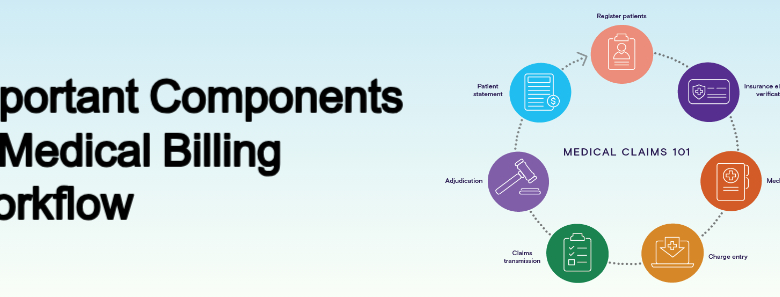Benefits of Partnering with a Medical Billing Company
Introduction In the ever-evolving healthcare landscape, medical practices face significant challenges in managing their revenue cycle efficiently. Medical billing is a complex and time-consuming process that requires expertise, accuracy, and compliance with constantly changing regulations. For healthcare providers, outsourcing their billing needs to a professional Medical Billing Company can be a game-changer. In this article, we will explore the key benefits of partnering with a professional medical billing company and how it can enhance the overall efficiency and profitability of healthcare practices. Also Read: Role of Coding and Revenue Cycle Management in Healthcare Benefits of Partnering with a Professional Medical Billing Company Partnering with a professional Medical Billing Company offers a range of advantages that can transform the financial and operational aspects of a healthcare practice. From improving cash flow and reducing billing errors to ensuring compliance with regulatory standards, outsourcing medical billing is a strategic decision that delivers long-term benefits. Below, we dive deeper into the specific advantages of working with a specialized medical billing service: Improved Revenue Cycle Management One of the primary benefits of partnering with a professional medical billing company is the enhancement of revenue cycle management. A well-managed revenue cycle ensures that healthcare providers receive timely payments with minimal denials. Professional medical billing companies like RevMax Healthcare specialize in streamlining billing processes, reducing claim denials, and accelerating reimbursements. Reduced Billing Errors and Compliance Risks Medical billing errors can lead to claim denials, delayed payments, and financial losses for healthcare providers. A Medical Billing Company employs experienced billing professionals who ensure accurate coding, claim submission, and adherence to regulatory guidelines. With ever-changing healthcare regulations, partnering with a professional medical billing service helps healthcare providers stay compliant with HIPAA, ICD-10, CPT, and other industry standards. Also Read: How to Choose the Right Medical Billing Company? Cost Savings and Increased Efficiency Managing an in-house billing department can be expensive, requiring investments in training, software, salaries, and office space. By outsourcing to a Medical Billing Company, healthcare providers can significantly reduce operational costs while gaining access to cutting-edge billing technology. This leads to improved efficiency, allowing medical professionals to focus on patient care rather than administrative burdens. Faster Claim Processing and Higher Reimbursement Rates A professional medical billing company utilizes advanced billing software, automated claim submission, and real-time eligibility verification to expedite claim processing. Faster claims lead to quicker reimbursements, minimizing cash flow disruptions. Additionally, experienced billing specialists negotiate higher reimbursement rates and ensure maximum claim approvals. Also Read: Key Features of Medical Billing Enhanced Patient Satisfaction and Focus on Patient Care Medical professionals should prioritize patient care without being overwhelmed by administrative tasks. A Medical Billing Company handles all billing-related responsibilities, enabling healthcare providers to focus on delivering quality patient care. Improved financial stability also allows healthcare practices to invest in better facilities and patient services, enhancing overall patient satisfaction. Access to Advanced Billing Technology Keeping up with the latest billing technology and software updates can be challenging for medical practices. Professional medical billing companies use state-of-the-art billing systems, electronic health records (EHR), and analytics tools to optimize billing processes. These technologies help identify billing trends, detect errors, and ensure smooth financial operations. Also Read: Common Medical Billing and Coding Errors Scalability and Business Growth As healthcare practices grow, their billing needs become more complex. A Medical Billing Company provides scalable solutions to accommodate increasing patient volumes, additional healthcare providers, and expanding services. Outsourcing medical billing ensures that the revenue cycle adapts to business growth without compromising efficiency. Transparency and Real-Time Reporting Healthcare providers need access to real-time financial data to make informed business decisions. Professional medical billing companies offer comprehensive reporting and analytics, providing transparency in revenue cycle performance. These insights help healthcare practices track financial health, identify revenue leakage, and optimize billing strategies. Reduced Administrative Burden and Stress Medical billing involves complex tasks such as claim submission, insurance verification, follow-ups, and appeals. Managing these responsibilities in-house can be overwhelming for medical staff. Partnering with a professional Medical Billing Company relieves healthcare providers of administrative stress, allowing them to focus on patient engagement and practice growth. Compliance with Healthcare Regulations Healthcare regulations and insurance policies frequently change, making compliance a significant challenge for medical practices. A professional medical billing service ensures adherence to federal and state regulations, reducing legal risks and potential penalties. Compliance management by experts safeguards the reputation and financial stability of healthcare providers. Customizable Solutions for Different Specialties Different medical specialties require tailored billing solutions. Whether it is cardiology, dermatology, neurology, or orthopedics, a professional Medical Billing Company provides customized billing services that align with the unique requirements of each specialty. This specialization leads to higher claim acceptance rates and optimized revenue cycles. Better Handling of Insurance and Denial Management Dealing with insurance companies and handling claim denials can be frustrating for medical practitioners. A professional medical billing company has a dedicated team to manage insurance follow-ups, appeals, and denial resolution. Their expertise increases claim acceptance rates and ensures that practices receive the payments they deserve. Data Security and HIPAA Compliance Patient data security is a critical concern for healthcare providers. A reputable Medical Billing Company ensures strict compliance with HIPAA and other data security regulations. Secure data handling practices protect sensitive patient information, reducing the risk of data breaches and legal liabilities. Competitive Advantage in the Healthcare Industry In today’s competitive healthcare environment, efficiency and financial stability are essential for success. By outsourcing medical billing services to a professional provider like RevMax Healthcare, healthcare practices gain a competitive advantage. They can offer better patient care, expand services, and improve overall operational efficiency. Conclusion Partnering with a professional Medical Billing Company is a strategic move that offers numerous benefits, from improved revenue cycle management and cost savings to enhanced compliance and patient satisfaction. Outsourcing medical billing ensures accuracy, faster claim processing, and access to advanced technology, allowing healthcare providers to focus on their primary goal: delivering quality patient care. For reliable and efficient medical billing services, consider working with RevMax Healthcare, a trusted











